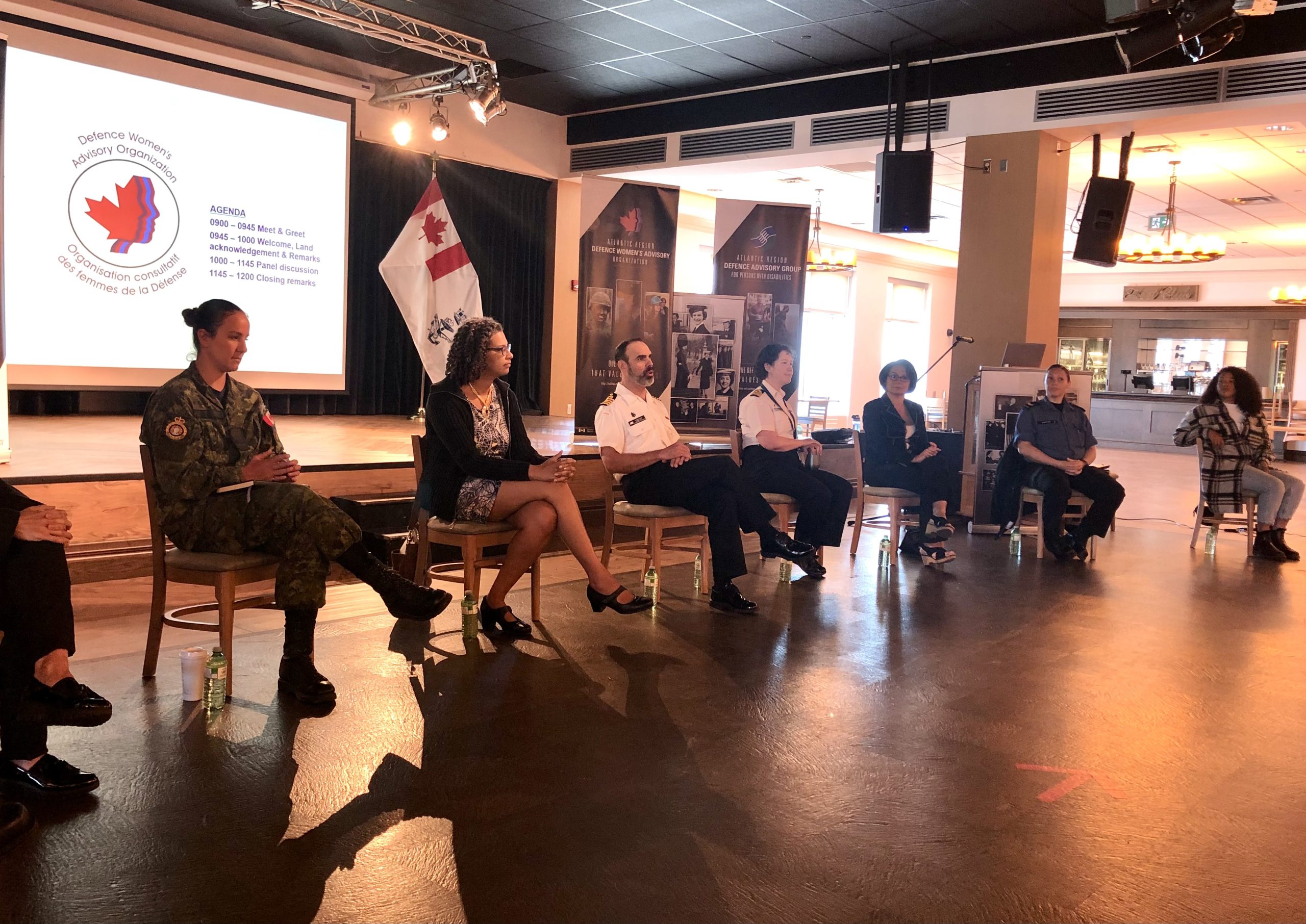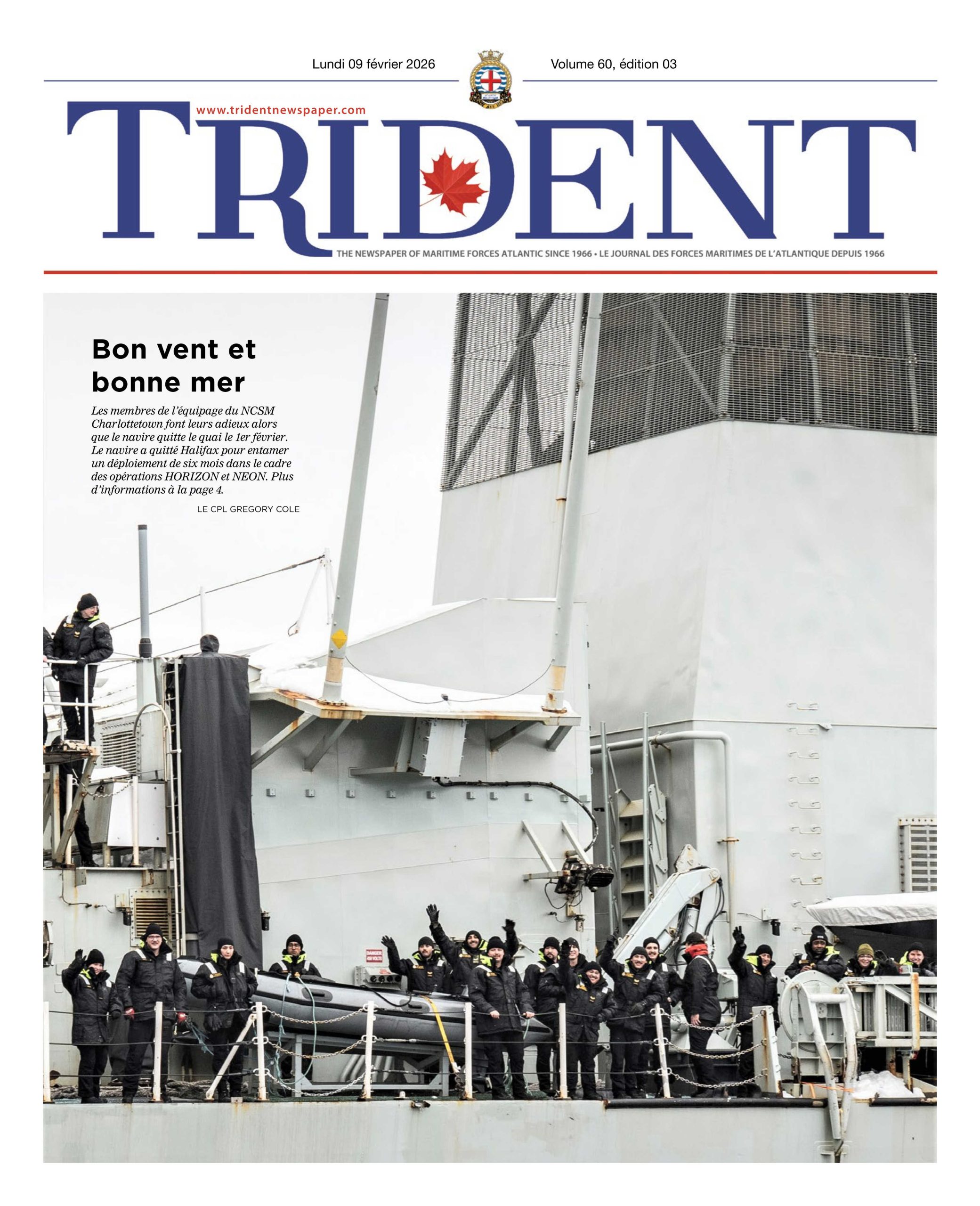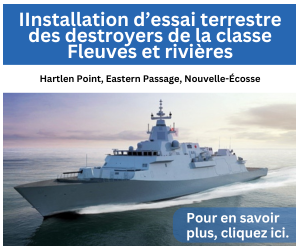
JOANIE VEITCH
DWAO panel discusses women in STEM
Par Joanie Veitch,
Équipe du trident
There’s a bright future for women pursuing a career in science, technology, engineering and mathematics (STEM) but there are still too few women entering the field, and even fewer who stay.
That “leaky pipeline” in retaining women in STEM careers — especially in leadership positions — was one of the challenges discussed at a Women in STEM panel hosted by the MARLANT Defence Women’s Advisory Organization (DWAO) on June 23 at CFB Halifax’s Tribute Tower.
Although 47 per cent of the total workforce are women, they make up only 23 per cent of people employed in STEM careers. In the military those numbers are even lower, especially in leadership roles, said Captain (Navy) Michel Thibault, Commanding Officer of Fleet Maintenance Facility Cape Scott (FMFCS) and — as local leadership champion for the DWAO — one of the nine panelists at the event.
“We really have a long way to go. Part of today’s objective is to increase awareness and look at ways to encourage women to look at STEM as a career… and to support them at every step of the way,” he said.
While there are many ways to make the physical working environment more welcoming to women, the biggest challenge is in changing how people think, especially in the military which is a more “male-dominated” environment, he added.
That shift in thinking has benefits beyond simply boosting the number of women working in STEM fields, said Commander Helga Budden, a Naval Engineering Officer with 30 years of experience and the senior female naval engineer on the East Coast.
“In making women feel at home we make everyone feel at home. It’s not a zero-sum game,” said Cdr Budden.
Inclusion and diversity is proven to strengthen the workplace, especially in the field of STEM, said Dr. Sarah Wells, Assistant Dean of Medical Sciences at Dalhousie University.
“The diversity of a team improves productivity, it improves the problem solving capabilities of the team… and the literature supports this,” Dr. Wells added.
While there are no easy answers to increase the number of women working in STEM, young girls growing up need to see examples of women working in STEM, and the notion of what a STEM career is needs to be broadened, the panelists said.
“There are so many different things you can do. The best way forward is to keep an open mind and enjoy the journey,” said Dr. Alexandra Merkx-Jacques, manager of the Energy, Environment and Resources division of the Natural Sciences and Engineering Research Council of Canada (NSERC).
Although she has had an impressive career so far, Merkx-Jacques said she still feels she didn’t get a full picture of what was possible when she was making decisions about her future.
“Now that I look back, I wish I had more opportunities to explore the trades. That wasn’t something I thought about… there’s so much more out there.”
Cheyenne McPherson, a certified Red Seal Industrial Mechanic (Millwright) who works at FMFCS at the Halifax Dockyard, said even from a young age she knew that she wanted to work in the skilled trades and was thrilled after learning about millwright opportunities through a career exploration course with the Nova Scotia Community College.
“You get to do so much — you’re machining, you’re welding, you’re working on pumps and hydraulics… there are so many routes you can take,” she said.
As the only woman in her class, McPherson said the biggest lesson she learned was the importance of asking questions.
“You’re there to learn. Most times there are others who don’t know the answers either. You’re on this earth to learn so don’t be scared to speak up and ask when you don’t know something,” she said.
Growing up in Lebanon, Ghada Fakhri, a professional engineer and the Industrial Engineering Manager at FMFCS, said she always knew she wanted a career in engineering.
While learning technical skills is a crucial part of any career path in STEM, she said learning to push through fear is key to finding a career path as well.
“Don’t be afraid to take math or science courses. It’s important to keep trying, even if you’re afraid you might not make it. Try, fail, start again,” she said.
According to Holly Scothorn, DWAO’s civilian co-chair and one of the event organizers, the panel discussion was the first in what is hoped to be an annual event.
Other panelists include Major Carole Garrett, Aircraft Maintenance Officer at 12 Air Maintenance Squadron at Shearwater, Captain Dani Vortisch, Requirements Officer with Real Property Operations at CFB Halifax, and S1 Meghan Johnston, a Weapons Engineering Technician with the future HMCS Max Bernays.
Commander Beth Vallis, past Commanding Officer at HMCS Scotian, gave the closing remarks. Thanking both the panelists and DWAO for making the event happen, Cdr Vallis emphasized the importance of talking about women in STEM.
“There are gender gaps in the workplace,” she said. “We have to support one another and look for support among our male colleagues as well.”






